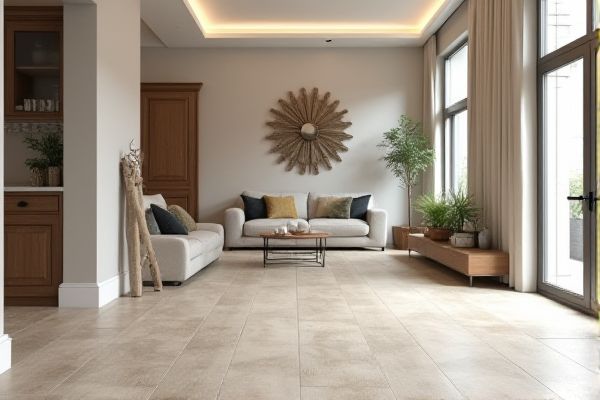
Vinyl flooring offers a softer, more affordable, and water-resistant surface, ideal for areas prone to moisture, while porcelain tile provides superior durability, scratch resistance, and a timeless aesthetic suitable for high-traffic spaces. Explore this article to discover which option best aligns with your home's style and functionality needs.
Table of Comparison
| Feature | Vinyl Flooring | Porcelain Tile |
|---|---|---|
| Material | Synthetic polymer, primarily PVC | Manufactured ceramic, dense and durable |
| Durability | Good for moderate traffic, prone to scratches | Highly durable, resistant to scratches and wear |
| Water Resistance | Waterproof varieties available | 100% waterproof and moisture resistant |
| Installation | Easy DIY with click-lock or glue-down options | Requires professional installation with mortar and grout |
| Cost | Lower cost, $2 to $7 per sq. ft. | Higher cost, $5 to $15 per sq. ft. |
| Maintenance | Simple cleaning with mop and mild detergent | Low maintenance, requires occasional grout cleaning |
| Lifespan | 10 to 20 years | 25 to 50 years or more |
| Comfort | Softer underfoot, warmer | Hard and cold underfoot, may require underfloor heating |
| Appearance | Variety of designs, mimics wood and stone | Natural stone look, elegant finishes |
Introduction to Vinyl Flooring and Porcelain Tile
Vinyl flooring offers a durable, water-resistant surface ideal for high-traffic areas and is available in various styles mimicking natural materials. Porcelain tile provides exceptional hardness, moisture resistance, and longevity, making it suitable for kitchens and bathrooms. Choosing between vinyl flooring and porcelain tile depends on your budget, design preferences, and maintenance requirements.
Material Composition and Manufacturing Process
Vinyl flooring consists of polyvinyl chloride (PVC) combined with plasticizers, stabilizers, and pigments, produced through a calendering or extrusion process resulting in flexible sheets or tiles. Porcelain tiles are made from refined clay, kaolin, feldspar, and quartz, fired at extremely high temperatures above 1,200degC, creating a dense, durable, and water-resistant material. Understanding these differences in material composition and manufacturing process helps you choose flooring that best suits your durability and maintenance needs.
Appearance and Design Versatility
Vinyl flooring offers a wide array of styles, patterns, and colors that closely mimic natural wood, stone, and ceramic, providing exceptional design versatility for any interior aesthetic. Porcelain tile, known for its high-gloss finishes and intricate designs, delivers a more traditional but highly durable look, ideal for classic or modern spaces. Your choice depends on whether you prioritize the realistic textures and affordability of vinyl or the luxurious, long-lasting appeal of porcelain tile.
Durability and Lifespan
Vinyl flooring typically offers moderate durability with a lifespan of 10 to 20 years, depending on quality and maintenance, making it suitable for residential areas with moderate foot traffic. Porcelain tile excels in durability, resisting scratches, moisture, and stains, often lasting 50 years or more with minimal wear, ideal for high-traffic and moisture-prone environments. The superior hardness and density of porcelain tile contribute to its longer lifespan compared to the more flexible and softer vinyl flooring.
Water and Stain Resistance
Vinyl flooring offers excellent water resistance due to its non-porous surface, making it highly suitable for moisture-prone areas like bathrooms and kitchens. Porcelain tile features superior stain resistance and is virtually impervious to water, thanks to its dense, vitrified composition and glazed finish. Both materials provide durable protection against water damage and stains, but porcelain tile typically delivers a longer lifespan in extreme moisture conditions.
Installation Methods and Ease
Vinyl flooring offers a straightforward installation process with options like peel-and-stick, click-lock, and glue-down methods, making it accessible for DIY enthusiasts and minimizing installation time. Porcelain tile demands a more complex approach involving subfloor preparation, mortar application, precise tile placement, and grout finishing, often requiring professional skills for optimal results. Choosing vinyl flooring can simplify your installation experience, while porcelain tile offers durability at the cost of a more labor-intensive setup.
Comfort and Underfoot Feel
Vinyl flooring offers superior comfort and a softer underfoot feel due to its cushioned layers and flexibility, making it ideal for prolonged standing or walking areas. Porcelain tile, while highly durable and resistant to wear, is hard and cold underfoot, often requiring additional rugs or radiant heating systems to enhance comfort. The thermal insulation properties of vinyl contribute to warmth, whereas porcelain's dense composition results in a cooler surface temperature.
Maintenance and Cleaning Requirements
Vinyl flooring requires minimal maintenance, needing only regular sweeping and occasional mopping with a damp cloth to keep it clean and free of stains. Porcelain tile demands more intensive cleaning, including grout scrubbing and periodic sealing to prevent discoloration and mold buildup. Both materials are durable, but vinyl's water-resistant properties make it easier to maintain in high-moisture environments compared to porcelain tile.
Cost Comparison and Value
Vinyl flooring offers a lower upfront cost, typically ranging from $2 to $7 per square foot, making it a budget-friendly option compared to porcelain tile, which costs between $5 and $15 per square foot. Vinyl provides good value for areas requiring water resistance and ease of installation, while porcelain tile delivers long-term durability, higher resale value, and superior resistance to scratches and wear. Choosing between vinyl and porcelain flooring depends on balancing immediate budget constraints with desired longevity and property value enhancement.
Environmental Impact and Sustainability
Vinyl flooring is made from synthetic materials derived from petroleum, resulting in higher environmental impact due to non-renewable resource use and challenges in recycling. Porcelain tile, composed of natural clay and minerals, offers greater sustainability with durability and recyclability that reduce waste over its lifespan. Choosing porcelain tile supports eco-friendly flooring by minimizing your carbon footprint and promoting long-term resource conservation.
 homyna.com
homyna.com